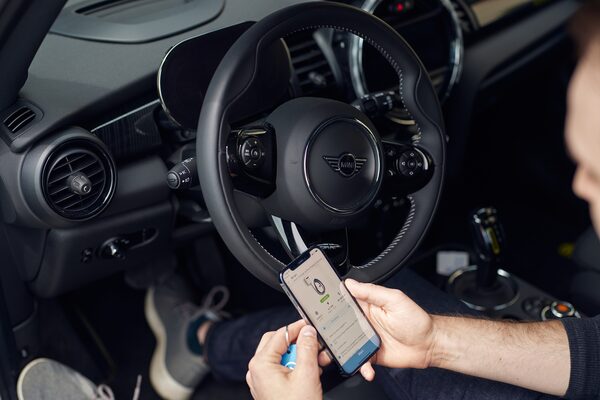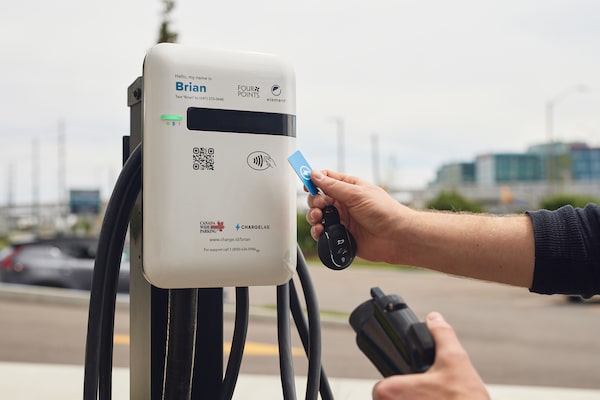“That’s how we’ll change the world”
ChargeLab founder on how electric charging infrastructure is changing the way we drive
Through seamless charging infrastructure and an eye for innovation, one startup founder is taking on the climate crisis
Zak Lefevre was fascinated by electric cars long before he founded Toronto-based EV software startup ChargeLab.
There was just one problem: It was 2015, electric cars were far less common than they are today, and he’d never actually driven one.
Born and raised in Ontario, Lefevre had graduated from McGill University with an Arts Degree in computer science and participated in the Next 36 startup incubator. But by that point, he was looking for a business idea.
“I just started going to these electric vehicle meetups around the city,” he said. “I’d walk around, admiring everyone else’s cars and chatting about what they were like to own. Nobody was trying to sell anything, but I realised something special was going on.”

ChargeLab mobile appsupplied
The meetups confirmed Lefevre’s inkling that electric vehicles were about to go mainstream, but they didn’t get him behind the wheel of one. So in 2015, he treated himself to a ride in a brand-new electric car share vehicle. A few months later, he founded ChargeLab.
“I thought, ‘this is going to be the future, so how can I be part of this industry?’” Lefevre says. “From talking to people about their struggles, it became obvious to me that infrastructure was super essential but often overlooked and unsexy. I thought, ‘Well, I’ll work on the unsexy.’”
At first, Lefevre simply resold and installed charging equipment, which is what clued him into the problem ChargeLab has now set out to solve.
Essentially, recharging an electric vehicle or setting up a charging station should be easy. After all, there are a lot more connections to the energy grid out there than there are suitable places for gas.
But it isn’t like that. Different charger and vehicle manufacturers have different standards and software, making for a confusing patchwork of options for drivers and a headache for businesses, governments and families who want to install chargers.
So, Lefevre decided to fix that: His startup is creating universalizable software that drivers can use across a range of charging hardware, eliminating friction points in the refuelling process to make it easier to find a place to juice up.
“We’re the Android of EV charging,” Lefevre says. “Our platform runs on top of 50 different chargers from over a dozen top equipment manufacturers. ChargeLab also works with every EV on the road today, including the all-electric MINI Cooper SE.”
“This is going to be the future, so how can I be part of this industry?”
Zak Lefevre
They’re on their way. The company now has more than two dozen employees across Toronto and the Bay Area. Lefevre brought on a co-founder and chief technology officer, Ehsan Mokhtari, last year.
It hasn’t always been smooth sailing, though. The electric vehicle sector is heavily regulated in some regions, and the company has had to adapt to changing legislation in large markets like Europe and California.
“Aside from differing regional requirements, we’ve had the same challenges as many startups with finding capital and talent,” Lefevre says. “I think maybe if I had been a serial entrepreneur who had done this many times before, I might have avoided that, but there have been times when I’ve pitched to the wrong investor or made the wrong decision.”

ChargeLab electric vehicle chargersupplied
“Luckily we’ve got a great crew on board now, though,” he notes. That’s thanks in part to being accepted into URBAN-X, a Brooklyn-based venture accelerator funded by MINI and parent BMW Group that aims to revolutionize urban transport through innovative green technology and design, over and above the company’s core competency of manufacturing vehicles like the new all-electric MINI Cooper SE.
“It was a million-dollar opportunity for us,” Lefevre says. “They’re not your usual accelerator. They’re already focused on infrastructure and cities and the environment, so they were speaking our language.”
“At the end of the day, they have the same point of view as we do: fixing the climate crisis isn’t something philanthropists and NGOs are going to do on their own,” he adds. “That stuff is important, but if something is profitable and good for the environment, that’s how we’ll change the world.”
Advertising feature produced by Globe Content Studio with MINI. The Globe’s editorial department was not involved.